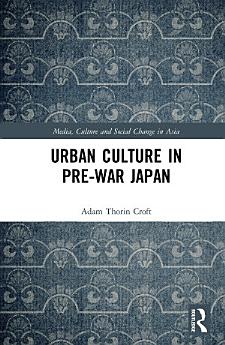Urban Culture in Pre-War Japan
Adam Croft
মে’ ২০১৯ · Routledge
ইবুক
284
পৃষ্ঠা
family_home
যোগ্য
info
reportমূল্যাংকন আৰু পৰ্যালোচনা সত্যাপন কৰা হোৱা নাই অধিক জানক
এই ইবুকখনৰ বিষয়ে
Politically the 1910s and 1920s were dark days for Japan: economic instability, frequent political assassinations, and increasing violent military interventions at home and overseas affected many. This book explores the literature of the period, showing how it contributed to this overall mood. It focuses on the Tatsukawa Library, an unusual collection of military chronicles based on traditions of popular storytelling found in the yose — a network of small theatrical venues that provided the masses living and working in Japan’s major cities with affordable entertainment. Capitalising on local advances in Western-style printing, the series facilitated a ‘new wave’ of literature that appealed especially to young, marginalised, economically-insecure urban youths. This book discusses how the narrative content of the Tatsukawa Library, which focuses on historical samurai struggling valiantly against adverse circumstances, helped inspire a generation with admiration for violence. This work also examines how this outlook fitted with the Japanese state’s reintroduction of imperial propaganda.
লিখকৰ বিষয়ে
Adam Croft is an Honorary Lecturer in the School of Culture, History and Language in the College of Asia and the Pacific at the Australian National University, Canberra.
এই ইবুকখনক মূল্যাংকন কৰক
আমাক আপোনাৰ মতামত জনাওক।
পঢ়াৰ নির্দেশাৱলী
স্মাৰ্টফ’ন আৰু টেবলেট
Android আৰু iPad/iPhoneৰ বাবে Google Play Books এপটো ইনষ্টল কৰক। ই স্বয়ংক্রিয়ভাৱে আপোনাৰ একাউণ্টৰ সৈতে ছিংক হয় আৰু আপুনি য'তে নাথাকক ত'তেই কোনো অডিঅ'বুক অনলাইন বা অফলাইনত শুনিবলৈ সুবিধা দিয়ে।
লেপটপ আৰু কম্পিউটাৰ
আপুনি কম্পিউটাৰৰ ৱেব ব্রাউজাৰ ব্যৱহাৰ কৰি Google Playত কিনা অডিঅ'বুকসমূহ শুনিব পাৰে।
ই-ৰীডাৰ আৰু অন্য ডিভাইচ
Kobo eReadersৰ দৰে ই-চিয়াঁহীৰ ডিভাইচসমূহত পঢ়িবলৈ, আপুনি এটা ফাইল ডাউনল’ড কৰি সেইটো আপোনাৰ ডিভাইচলৈ স্থানান্তৰণ কৰিব লাগিব। সমৰ্থিত ই-ৰিডাৰলৈ ফাইলটো কেনেকৈ স্থানান্তৰ কৰিব জানিবলৈ সহায় কেন্দ্ৰত থকা সবিশেষ নিৰ্দেশাৱলী চাওক।








